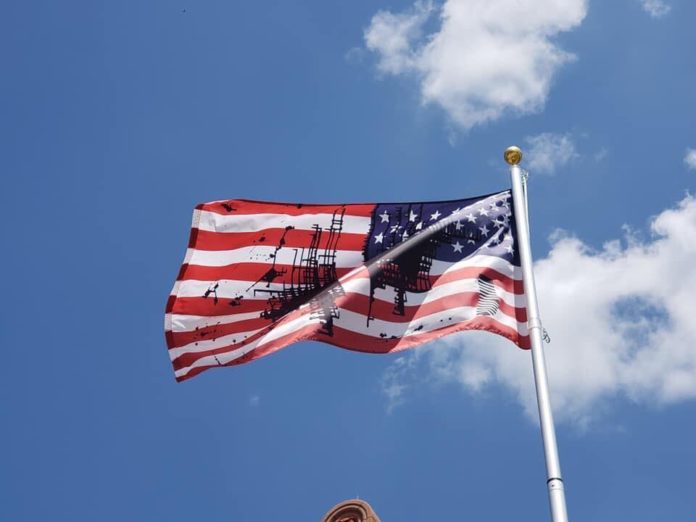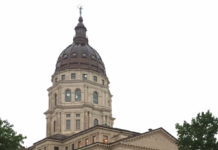(Updated to reflect status of flag, comment from chancellor; edits throughout)
The University of Kansas on Wednesday moved a piece of campus art – a paint-splattered American flag – after a storm of political protests.
The university took down the flag late Wednesday afternoon after two of the major Republican gubernatorial candidates called for it to be removed.
Republican Gov. Jeff Colyer on Wednesday demanded the university remove the flag from outside Spooner Hall, saying that “the disrespectful display of a desecrated American flag on the KU campus is absolutely unacceptable.”
“Men and women have fought and bled for that flag and to use it in this manner is beyond disrespectful,” Colyer said.
The governor told University of Kansas Chancellor Doug Girod and Board of Regents President Blake Flanders of his disappointment that a “taxpayer-funded institution would allow such a display of our sacred flag.”
The flag outside Spooner Hall, part of a national art project, has been generating a storm since images of it started circulating on social media on Tuesday.
By Wednesday, the president of the Kansas Senate called it an “absolute disgrace” and one congressional candidate said it disrespected members of the military. A Fox News columnist also chipped in with his criticism.
Hours earlier, Colyer’s Republican gubernatorial rival, Kris Kobach, called on the university to remove the flag as well.
“This is a perfect example of how something is called art when it’s nothing more than left-wing propaganda,” the secretary of state said in an interview. “It’s a flag that’s protesting Trump and protesting immigration enforcement.”

Jonathan Shorman from the Wichita Eagle posted this picture on Twitter late Wednesday indicating that the university removed the artwork. School officials said late Wednesday that the exhibit was being relocated.
“Over the course of the day, the conversation around this display has generated public safety concerns for our campus community,” Girod said in a statement. “While we want to foster difficult dialogue, we cannot allow that dialogue to put our people or property in harm’s way.”
Girod said the school was moving the exhibit to the Spencer Museum of Art, “where we can continue the important conversation it has generated.”
Flanders thanked Girod for moving the flag.
“I would like to thank all those who expressed their concerns to the Board of Regents about this issue, including Gov. Colyer, members of the Legislature and many Kansans,” he said. “Input from the public is important to the board’s mission.”
The artwork, by German artist Josephine Meckseper, is part of a national public art project called, “Pledges of Allegiance.” It was commissioned by Creative Time, a New York-based public arts nonprofit.
The Commons and the Spencer Museum of Art partnered to host the project at KU, according to a news release issued last November. It was not publicly funded.
The university described the project as serialized commission of 16 flags, “each created by an acclaimed artist to reflect the current political climate.” KU was one of 11 institutions participating in the project.
In a post on the Creative Time website, the artist describes the piece as a “collage of an American flag and one of my dripped paintings, which resembles the contours of the United States.”
“I divided the shape of the country in two for the flag design to reflect a deeply polarized country in which a president has openly bragged about harassing women and is withdrawing from the Kyoto protocol and U.N. Human Rights Council,” she wrote on the website.
“The black and white sock on my flag takes on a new symbolic meaning in light of the recent imprisonment of immigrant children at the border.”
Kobach denounced the piece as a nothing more than “a political statement being dressed up as art that also involves desecration of the American flag.”
“They evidently think at KU that if you call it art, you can get away with anything you want to and that people won’t be offended,” Kobach said.
“I can imagine right now there are tens of thousands of Jayhawks all across Kansas who are wondering what the heck their university is thinking,” he said.
Other politicians were weighing in on Twitter on Wednesday afternoon.
Republican state Rep. Ken Corbet of Topeka joined with Colyer and Kobach, posting on Twitter that “this disrespectful art should come down immediately.”
“It’s unbelievable that a taxpayer funded institution is desecrating our flag in this way,” Corbet tweeted.
This is not the first time that the university has run afoul of state leaders over freedom of expression, putting school administrators in the position of balancing free-speech with the risk of offending a Legislature that controls the purse strings.
Five years ago, a KU journalism professor created a firestorm when he posted a comment on Twitter wishing violence on the families of NRA members after the Washington Navy Yard shootings.
David Guth was placed on indefinite leave in that case although he was later allowed to return to the school. He apologized for his comments.
















